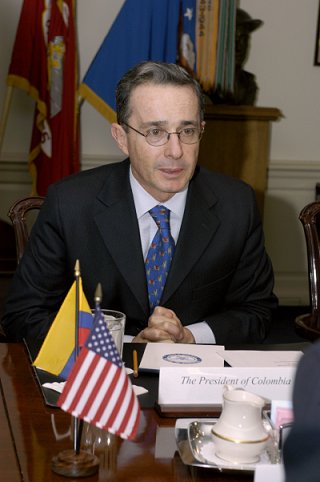 This past Sunday, Colombian voters defied predictions and opted by a wide margin for the hand-picked successor of President Alvaro Uribe, a stalwart U.S. ally. When Secretary of State Hillary Clinton visits Colombia next Wednesday, she can show that we value this relationship by pledging to press for ratification of a bilateral trade agreement that has been languishing in the Congress for over three years.
This past Sunday, Colombian voters defied predictions and opted by a wide margin for the hand-picked successor of President Alvaro Uribe, a stalwart U.S. ally. When Secretary of State Hillary Clinton visits Colombia next Wednesday, she can show that we value this relationship by pledging to press for ratification of a bilateral trade agreement that has been languishing in the Congress for over three years.
In Sunday’s voting, Uribe’s former defense minister, Juan Manuel Santos, garnered 46.6% of the votes in a nine-way race, compared to 21.5% for his nearest competitor, former Bogota mayor and Green Party candidate Antanas Mockus. The top two finishers will face off in second-round voting on June 20, and Santos has the upper hand.
These results should be reassuring to Americans, in light of Colombia’s close friendship with the United States and Santos’ firm commitment to fighting the narcoterrorists who subsist on cocaine and heroin trafficking. Also, U.S. businesses have about $6 billion invested in Colombia, and two-way trade is about $30 billion and growing. A U.S.-Colombia free trade agreement would help preserve that market for U.S. exporters and bolster a friendly nation that is a bulwark against anti-American Venezuelan dictator Hugo Chavez.
Substantial U.S. support for Uribe’s get-tough policies during the last decade has helped Colombians recover their economy and their democratic institutions, taming narcoterrorist groups by using stepped-up security measures to impose the rule of law in the country’s unruly rural areas. Although Colombia is still grappling with corruption, its institutions are working as they should to hold people accountable.
The presidential election returns left the pollsters and pundits flummoxed. In April anti-Uribe forces were thrilled with Mockus’ extraordinary surge in the polls, up from a meager 5% in February to winning a theoretical matchup with Santos. Going into Sunday’s balloting, the polls showed Santos recovering a slight advantage, but most predicted a close finish between the front-runners.
As some analysts told me at the time, the April polls under-counted Santos’ support in the rural areas and over-sampled the urban vote where Mockus was stronger. Although short-lived, the Mockus surge was genuine, with voters beginning to see the unconventional outsider with a good track record in the capital city as a viable alternative.
However, Mockus peaked too early, giving voters time to reflect on whether they could trust their country’s fate to a man who, years ago, dropped his trousers to moon a raucous university crowd and donned a spandex “Super Citizen” costume. Apparently, Mockus also was hurt by his statement on April 26 that he “admire[s] some aspects” of Chavez, who most Colombians view as a dangerous bully. In the end, Santos even beat Mockus in key urban centers.
Mockus admitted Monday that overtaking Santos in a second round was “possible,” though “not probable.” Indeed, congressional representatives from the Conservative and Liberal parties–whose presidential candidates accounted for about 16% of the votes–are lining up behind Santos.
A Santos victory would be a vindication of President Uribe, who came to power in 2002 faced with two burgeoning guerrilla movements, rampant kidnappings and murders, and a shrinking economy. His no-nonsense “democratic security” policy has irritated the left but made him incredibly popular; most observers believe that Colombians would reelect Uribe if the law would allow it.
Secretary of State Hillary Clinton–who was more outspoken against the Colombia trade deal than President Barack Obama–is set to visit Colombia on June 9. Although she will not take sides in the presidential run-off, Clinton must find a way to signal to our best friend in the region that we value that partnership. For example, she could, at long last, tell the Colombians what they must do to demonstrate their commitment to labor rights in order to win approval of the trade deal in the U.S. Congress. A clear reaffirmation of our anti-drug alliance and trade ties with Colombia, coming from America’s foreign policy heavy weight, might actually keep Chavez’s cold war with Colombia from turning hot.
By opting for Uribe’s man for president, Colombians have proven that they are capable of making serious and sound choices about the future. Let’s hope Secretary Clinton will do so, as well.
* Roger F. Noriega was ambassador to the Organization of American States from 2001-2003 and Assistant Secretary of State from 2003-2005. He is a visiting fellow at the American Enterprise Institute and managing director of Vision Americas LLC, which represents U.S. and foreign clients.
Source: Forbes











[…] Colombia sticks with Santos Buoyed by the party machine and rural voters, a win for Juan Manuel Santos means an uphill battle for Antanas Mockus Colombians Opt For Strong U.S. Ties […]